Books in Print
|
Welcome to Michael Cullup's BOOKS IN PRINT
Here you'll find the books of mine that are still in print, and available.
If you have any difficulty in obtaining them, or need information about the other books I've published, please email me here.
Michael Cullup
|
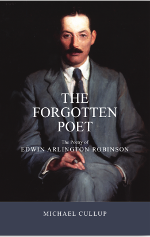
|
This new selection of Edwin Arlington Robinson’s poems, with a short introduction and bibliography, is the only selection currently (2022) in print. Fifty shorter poems have been selected from Robinson’s 1488 page Collected Poems, published in 1937 and never reprinted.
Publication Date: 31 July 2022. Price £14,99.
Available from Greenwich Exchange Publishing and all major booksellers.
|
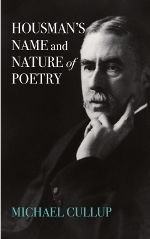
|
A description and analysis of the content of A.E.Housman's Leslie Stephen Lecture delivered at Cambridge University in 1933, together with its implications for modern poetry. Housman's argument for an emotional response to poetry became increasingly unfashionable, and continues to be so to this day. The book suggests that it's time to reconsider Housman's description of 'true poetry' as well as his own experience as a practising poet whose poems continue to be popular more than eighty years after his death.
Available from the publisher (Greenwich Exchange Publishing) and all major booksellers.
|

|
In his new collection (his third with Greenwich Exchange) Michael Cullup explores the hidden language behind what we actually want and try to say. The earlier influences of poets like Robert Graves and Robert Frost have given way to the later influences of poets like Conrad Aiken and W.S. Graham, whose methods are mediated by the preoccupations of a poet like C.H. Sisson. Through them, Michael Cullup has tried to find a way of being true to spontaneous feeling modulated by developing an easy and fluent line.
In his first three collections, Michael Cullup followed convention by giving his poems titles and restricting them to a single theme or idea. However, with Matelot, he broke free of this kind of restriction and tried to allow the sequence to find its own pace and rhythm. In doing so, he managed to open the way for less confined content and greater imaginative space. These new poems extend that exploration, the numbered sequence following its own drift.
The permanent themes of poetry (life, personal history, love, suffering, and death) are here set in the context of one man's subjective impressions of what has happened, and continues to happen, in his own personal life. There is no simple solution to the confusing experiences of a lifetime but, hopefully, a trust in language to unravel some of these confusions and give them validity on the page is the motivating pressure behind this sequence of poems.
|
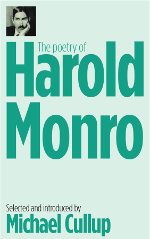
|
Early twentieth-century English poetry has become something of a critical backwater, with the term ‘Georgian’ rarely used as anything other than a term of disparagement. True, a few poets from that period – Edward Thomas and Robert Graves spring to mind – are still read with pleasure, but the work of most of their Georgian contemporaries is largely forgotten, apart from a handful of hardy perennial anthology pieces.
Michael Cullup finds the current neglect of Harold Monro’s poems a particularly grave and galling literary injustice, as he amply demonstrates in this critical appraisal and selection of his best poems. In these poems, Monro eschews the easy sentimentality long-associated with the period, striving towards greater realism and psychological truth.
Whether as a poet, editor of Poetry Review and Poetry and Drama or through his Poetry Bookshop in Bloomsbury, Monro acted as a sensitive mediator between the Georgians and the Modernists. Much of his work was highly respected by both T.S. Eliot and Ezra Pound.
The Poetry of Harold Monro is an important milestone in the revaluation of this unjustly neglected poet.
Visit this website to purchase a copy www.greenex.co.uk.
|
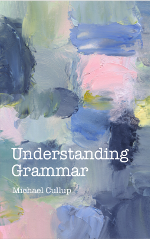
|
UNDERSTANDING GRAMMAR
Understanding Grammar is for everyone who wants to know more about English grammar.
It tells you how grammar actually works and demystifies technical terms.
This book is suitable for students at GCSE level and above, and will support teachers too.
There are helpful exercises designed to measure your levels of understanding and progress as you go through the book.
Michael Cullup spent many years as a teacher of English, both in England and overseas. He studied English Language and Literature at University College London and Birkbeck College London, and he studied linguistics as part of a postgraduate course at the University of Leeds. After overseas teaching posts with the Ministry of Overseas Development and the British Council in Kenya, Saudi Arabia, and Thailand, he returned to England to work for the Bell School of Languages in Norwich.
Visit this website to purchase a copy: www.greenex.co.uk
|
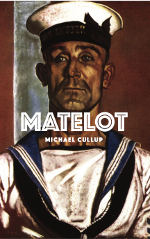
|
MATELOT
Michael Cullup’s long poem Matelot vividly recaptures the experiences of those who saw service aboard ship in the Royal Navy. Centring on the experiences of an Engineer Mechanic, Matelot describes life as it was then – the coarse language, the fights, the drunkenness, and, above all, the sterling comradeship.
Often forgotten in the popular imagination, the National Serviceman still has his tale to tell. Drawing inspiration from the realistic example of poets such as Alan Ross, Roy Fuller, Donald Davie and Charles Causley (all of whom had all served in the Navy) Cullup’s flexible, freer verse style brings back to life the voices of that past as they tell their intertwining and compelling stories.
It is, now, a time long gone, never to return. Matelot gives the reader some idea of what it was like to be part of it all – in its miseries, in its
excitements and pleasures.
And in all its anarchic glory, too.
Visit this website to purchase a copy: www.greenex.co.uk.
|
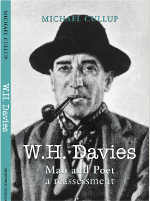
|
W.H. DAVIES: MAN AND POET - A REASSESSMENT
Even though he was once one of Britain’s most popular writers, the reputation of the poet and memoirist W.H. Davies has, in recent decades, gone into decline.
Davies’s colourful early life as a hobo and a tramp – captured by his most famous work The Autobiography of a Super Tramp – and his apparently ‘innocent’ poems about nature, tales about the seamier sides of life, his experiences on the road and verse portraits of those characters he met there – has led to the Welsh poet being placed under the cosy heading ‘Georgian’.
It has been a tag which does serious disservice to the tone, nature and ambition of Davies’s lyrics.
As poet and critic Michael Cullup shows in this brief but insightful exploration of the entirety of Davies’s output – the memoirs, the short stories as well as the poems – there was a more complex personality than the one suggested by his public persona. True, he was a figure at home with the Georgian literary world – Edward Thomas and Hilaire Belloc were close friends – yet he was also capable of impressing more avant-garde talents like Ezra Pound and Jacob Epstein.
In this bracing reappraisal Cullup judiciously undermines preconceived notions of Davies the writer to reveal a poetic imagination richer, more insightful, more thoughtful than that for which he is generally given credit. Included in this critical biography is a generous and illustrative selection of Davies’s verse.
Visit this website to purchase a copy: www.greenex.co.uk.
|

|
THE POETRY OF ROBERT GRAVES Published by Greenwich Exchange. 2012
Robert Graves (1895-1985) was a contemporary of Siegfried Sassoon, Wilfred Owen, and Edmund Blunden. He was an officer, as they were, inthe 1914-1918 War, but never regarded himself as a 'War' poet. He did write about his experiences of the War in Goodbye to All That, and hewas an admirer of Thomas Hardy, whom he knew personally.
Graves’ abandonment of his wife and family and his departure for Mallorca with the American poet Laura Riding in 1929, heralded adramatic change in his attitude to poetry. Under Riding’s influence, he began to write the clean, sharp, disciplined but often complex lyrics which are far removed from the style of his Georgian contemporaries. He became, in the 1930s, a‘modern’ poet. But he was never a ‘modern’ in the sense that T.S.Eliot, for example, was, and he represents a different tradition. Graves is, like Philip Larkin, an accessible poet. But he was always an individualist, and his views on poetry and poets are challenging and unconventional. Two books (‘The Crowning Privilege’, a prose work published by Penguin in 1959; and the ‘Collected Poems 1975’, his own final selection from his poems) represent the essential Graves, and this essay introduces the reader to the poet they reflect: a poet of exemplary courage, honesty, and poetic integrity.
Visit this website to purchase a copy: www.greenex.co.uk
|
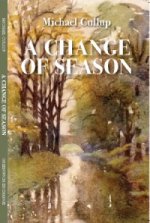
|
A CHANGE OF SEASON Published by Greenwich Exchange. 2010
The collection is selected mainly from poems written since the publication of ROAD INTO AUTUMN (Fen Press. 2000).
Copies can be obtained by contacting Peter Randall, Greenwich Exchange, 8 Balmoral Close, Billericay, Essex, CM11 2LL (01277-627471),
email: greenex01@globalnet.co.uk
You can also visit this website to buy a copy: www.greenex.co.uk
|
|
|
|
|
|
|
|
|
|
|
|
|

